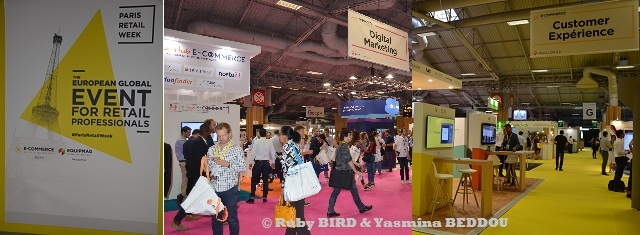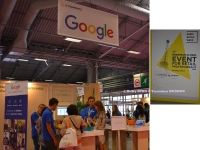Technology
Augmented Commerce effects on FRENCH People - Survey for PARIS RETAIL WEEK -
Sept 12-13-14, at PORTE DE VERSAILLES

(Source: © Ruby BIRD & Yasmina BEDDOU)
Paris Retail Week undertook a survey with OpinonWay regarding the Augmented Commerce and when shopping can happen at every instant of daily life. The digitalisation of French people's daily lives has had a lasting effect on their behaviour. Online shopping is becoming increasingly common and can happen at any time, on any device. What are the new relationships between brands and consumers in the face of these upheavals ?
With the arrival of digital in our daily lives, new moments of consumption through mobile tools are emerging and expanding. These instants of transition between two activities are paving the way for a new form of shopping. What are theses new moments of consumption ? At what times do the French want to consume and how ? How can brands establish themselves permanently in these instants and become the consumer's discrete shopping assistant ? Why should they invest in augmented commerce and offer shopping experiences in line with their customer's expectations ?
In a Survey conducted with OpinionWay, Paris Retail Week is shedding light on these new instants of consumption and consumer's expectations. With the development of communication tools and terminals, it is now possible to access the Internet anywhere, at any time, on a variety of devices : computer, smartphone, tablet... In addition, the development of e-payment technology had made it easier to make 'treat' purchases in an instant.
We can see that French people's practices have become digitalised to a large extent : 39% of them say they spend more time on online shopping than 10 years ago. This practice has even become the number one activity, ahead of preparing meals (33%). These uses are changing consumer buying behaviour. Consuming anywhere, anytime, is the logic behind ATAWAD (anytime, anywhere, any device), which has become a recurring theme among consumers. 50% of French people want to be able to shop at any moment, particularly young people aged 18 to 24 (78%).
Consumption time is no longer linear but split into consumption instants. 80% of French people have already transformed an instant that was once devoted to relaxing or leisure into a shopping instant (63% do so regularly), 70% have been shopping just before bedtime at least once, and 43% have taken advantage of the ad breaks in their TV programmes to shop online, a sign that consumption can now take place on a multi-screen basis.
This shows the emergeence of a style of consumption linked to micro-moments, which were previously lost or unused but are now used for shopping. With their mobiles, French people shop while waiting to meet people (25%), in waiting rooms (23%), on public transport (19%), between two meetings (18%) or at the hairdresser's (12%).
Young people are logically the most affected by this phenomenon, Under-35, digital natives for the most part, are adopting these new buying behaviors : 86% of them have used a micro-moment to do their shopping at least once, and 72% do so regularly.
Young people are logically the most affected by this phenomenon, Under-35, digital natives for the most part, are adopting these new buying behaviors : 86% of them have used a micro-moment to do their shopping at least once, and 72% do so regularly.
Understanding their expectations while respecting their privacy, such is the challenge set for the brands by French consumers. This balance is constantly changing and is difficult to determine. Indeed, for 85% of French people, the number one quality they seek in a brand is that it respects their privacy and only contacts them when they wish. They also expect brands to be present exactly whey they need them (71%) because they have a thorough knowledge of their expectations (62%), but equally that they exceed theses expectations (64%) by offering unique experience (57%).
It is noteworthy that 22% of French have made a brand into a life companion, to which they are attached and which has been in their life for a long time. While brands that can create attachment are very diverse, some main trends have emerged : luxury brands (clothing and cosmetics) have the potential to become essential. 34% of people attached to a brand mentioned a brand belonging to these categories.
The potential benefits of commitment to these brands are determined primarly by product satisfaction remaining unchanged over time (65%) but also by the brands' ability to renew themselves and continuously offer products tailored to consumers' needs (60%). To have long-term appeal, brands must thus provide a constant connection between continuity and rupture, satisfaction and anticipation of needs and trends, so thar their 'fans' can identify withe the brands values (30%).
Source : OpinionWay and Paris Retail Week
Ruby BIRD
http://www.portfolio.uspa24.com/
Yasmina BEDDOU
http://www.yasmina-beddou.uspa24.com/
Source : OpinionWay and Paris Retail Week
Ruby BIRD
http://www.portfolio.uspa24.com/
Yasmina BEDDOU
http://www.yasmina-beddou.uspa24.com/
Ruby Bird Yasmina Beddou Paris Retail Week Porte De Versailles Trends Training Innovation E Commerce Retail Survey Opinionway Augmented Commerce Shopping
Liability for this article lies with the author, who also holds the copyright. Editorial content from USPA may be quoted on other websites as long as the quote comprises no more than 5% of the entire text, is marked as such and the source is named (via hyperlink).






